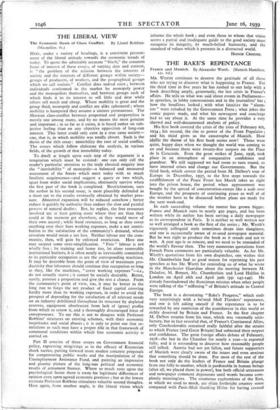THE LIBERAL VIEW
HERE, under a variety of headings, is a consistent present- ment of the liberal attitude towards the economic trends of today. To quote the admirably accurate " blurb," the common focus of interest of these essays, of varying date and context, is " the problem of the relation between the interests of society and the interests of different groups within society— groups of producers, of workers, and the geographical groups which we call nations." Conflict does indeed exist ; between individuals confronted in the market by monopoly power and the monopolists themselves, and between groups each of which finds it to its interest to sell little and dear while others sell much and cheap. Where mobility is great and the group fluid, monopoly and conflict are alike ephemeral ; where mobility is hampered they assume a sinister permanence. The Marxian class-conflict between propertied and propertyless is merely one among many, and by no means the most genuine and important ; in so far as it exists, it is based rather on sub- jective feeling than on any objective opposition of long-run interest. This latter could only exist in a true caste society— one, that is, in which mobility was totally absent. Such is the thesis of the title essay : immobility the root of social conflict. The essays which follow elaborate the analysis, in various fields, of the growth of that immobility today.
To dwell at length upon each step of the argument is a temptation which must be resisted : one can only call the reader's particular attention to the truly classical enquiry into the " inevitability " of monopoly—a balanced and measured assessment of the forces which meet today with so much fatalistic acquiescence—and suggest a query or two which, apart from wider social implications, obstinately survive when the first part of the book is completed. Restrictionism, says the author in his second essay, is most plausibly defended as a short cut to the results eventually obtained by market pres- sure. Abnormal expansion will be reduced somehow ; better reduce it quickly by authority than endure the slow and painful process of natural declinT. But, he replies, the free resources involved are at least getting more where they are than they could at the moment get elsewhere, or they would move of their own accord ; while fixed resources, so long as they cover anything over their bare working expenses, make a net contri- bution to the satisfaction of the community's demand, whose cessation would mean a net loss. Neither labour nor the com- munity, then, will gain by enforced restriction. Here one may suspect some over-simplification. " Free " labour is not wholly free ; by training and home ties, let alone removable institutional barriers, it is often nearly as irrevocably committed to its particular occupation as are the corresponding machines. It may be desirable from the point of view of maximum pro- ductivity that labourers should continue that occupation so long as they, like the machines, " cover working expenses "—i.e., do not actually starve ; it cannot be socially desirable. Better, surely, pension a proportion and give the rest a chance. From the community's point of view, too, it may be better in the long run to forgo the net product of fixed capital covering hardly more than its working expenses, in order to avoid the prospect of depending for the satisfaction of all relevant needs on an industry debilitated throughout its structure by depleted reserves, equipment obsolescent from lack of (gross) profits from which to renew it, and a thoroughly discouraged force of entrepreneurs. To say this is not to disagree with Professor Robbins' strictures on existing schemes, with their economic ineptitudes and social abuses ; it is only to point out that re- strictions as such may have a proper role in that framework of communal conditions within which free economic activity is carried on.
Part II consists of three essays on Government financial policy, expressing misgivings as to the efficacy of Keynesian shock tactics, putting forward more modest concrete proposals for compensating public works and the manipulation of the Unemployment Assistance Fund, and painting an impressive and gloomy picture of the long-run political and economic results of armament finance. Where so much rests upon the psychological factor there is room for legitimate differences of opinion even upon agreed economic premises ; but at the lowest estimate Professor Robbins stimulates valuable second thoughts. Here again, from another angle, is the liberal vision which • informs the whole book ; and even those to whom that vision seems a partial and inadequate guide to the good society must recognise its integrity, its much-belied humanity, and the standard of values which it presents in a distracted world.
HONOR CROOME.






















































 Previous page
Previous page